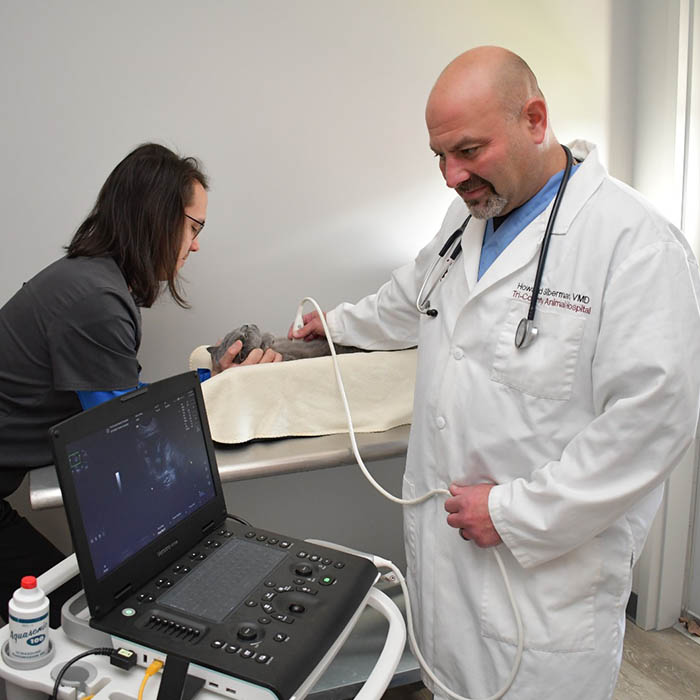Benefits of Early Diagnosis With a Board Certified Veterinary Cardiologist}
Wiki Article
Discovering the Necessary Providers Offered by a Vet Cardiologist: Recognizing Ultrasound and CT Check Methods
Veterinary cardiologists play a vital role in the health and wellness of animals by detecting and treating numerous heart disease. They utilize innovative imaging methods, such as heart ultrasound and CT scans, to offer accurate analyses. Each approach has its unique benefits and applications. Comprehending these strategies is essential for pet owners seeking the very best treatment for their buddies. What elements should pet dog proprietors consider when selecting between these diagnostic devices?
The Duty of Vet Cardiologists in Pet Health Care
Vet cardiologists play a vital duty in the healthcare of pets, focusing particularly on identifying and treating heart-related problems. They have specialized training that permits them to interpret complicated analysis examinations and recognize various cardiovascular problems. These specialists use advanced strategies, such as echocardiography and electrocardiography, to examine heart feature and framework accurately.Veterinary cardiologists additionally establish customized therapy plans that may consist of drugs, way of living adjustments, and, in some situations, surgical interventions. Their know-how includes educating family pet proprietors concerning heart health, highlighting the importance of normal check-ups and early discovery of prospective problems. Cooperation with basic vets is important, as it assures detailed look after pet dogs with believed heart issues. By offering specialized solutions, vet cardiologists considerably enhance the lifestyle for animals and supply peace of mind for their owners, strengthening the importance of heart health in overall animal wellness.Typical Heart Problems in Pets
Common cardiac concerns in pets can significantly affect their wellness and lifestyle. Heart whisperings, numerous sorts of cardiomyopathy, and hereditary heart defects are among one of the most widespread problems that veterinarians come across. Ultrasound For Dogs. Comprehending these issues is vital for pet proprietors to ensure timely medical diagnosis and ideal treatmentHeart Murmurs in Pets
Heart whisperings can be a resource of concern for pet owners, they are not always indicative of significant wellness concerns. A heart whispering is an uncommon audio created by stormy blood flow within the heart. In animals, these murmurs can be triggered by numerous elements, including genetic heart flaws, valve issues, or perhaps stress and anxiety throughout evaluations. Numerous pets with heart murmurs lead normal lives without considerable wellness impacts. To establish the underlying reason, vet cardiologists frequently use diagnostic techniques such as echocardiograms and Doppler ultrasounds. Early discovery and evaluation are important, as they may assist handle any kind of potential heart problems successfully. Family pet owners are encouraged to consult their veterinarian for a comprehensive examination if a heart whispering is identified.Cardiomyopathy Types Explained
Cardiomyopathy includes a group of conditions influencing the heart muscle mass, resulting in endangered heart function in family pets. One of the most usual kinds consist of dilated cardiomyopathy (DCM), hypertrophic cardiomyopathy (HCM), and limiting cardiomyopathy (RCM) DCM largely affects pet dogs, causing the heart to expand and weaken, which decreases its capacity to pump blood effectively. In contrast, HCM is a lot more widespread in felines, characterized by the thickening of the heart walls, typically resulting in obstructed blood circulation. RCM, though less common, happens when the heart muscle mass ends up being stiff, limiting its ability to loaded with blood. Each kind provides unique obstacles in medical diagnosis and therapy, demanding specialized veterinary cardiological analysis to ensure peak monitoring and look after influenced pets.Hereditary Heart Problems
Genetic heart issues stand for a considerable category of heart concerns in animals, distinctive from acquired conditions such as cardiomyopathy - CT Scans For Animals. These defects are architectural abnormalities present at birth, impacting the heart's normal function. Typical types include license ductus arteriosus, ventricular septal flaws, and pulmonic constriction. Signs and symptoms may vary commonly, ranging from light to extreme, and can include workout intolerance, coughing, and problem breathing. Early medical diagnosis via sophisticated imaging techniques like ultrasound is crucial for effective monitoring. Vet cardiologists play a vital duty in recognizing these conditions and suggesting proper treatment choices, which may include medical administration or surgical treatment. Recognizing congenital heart problems enables better end results and boosted quality of life for impacted petsRecognizing Heart Ultrasound: Exactly How It Works
A substantial variety of vet techniques currently utilize cardiac ultrasound as an essential analysis device for evaluating heart wellness in animals. This non-invasive strategy utilizes high-frequency acoustic waves to produce photos of the heart's framework and function. During the procedure, a vet service technician applies a gel to the animal's breast and utilizes a transducer to discharge ultrasound waves. These waves jump off the heart and bordering structures, creating real-time images on a monitor.Veterinarians can evaluate numerous facets of heart wellness, including chamber dimension, wall surface movement, and shutoff function. Additionally, heart ultrasound permits the discovery of irregularities such as fluid accumulation and genetic heart defects. This technique is vital for detecting problems that may not be noticeable through typical radiographs. By providing comprehensive details about the hop over to these guys heart's makeup and efficiency, heart ultrasound aids in developing reliable therapy prepare for pets experiencing from heart problem.The Relevance of CT Checks in Identifying Heart Conditions
Exactly how do CT scans improve the diagnosis of heart disease in vet medication? CT scans give comprehensive cross-sectional pictures of the heart and surrounding structures, enabling vets to visualize complex anatomical partnerships. This imaging technique is particularly valuable in identifying congenital heart issues, cardiac lumps, and abnormalities in blood vessels. By using sophisticated imaging formulas, CT scans can examine heart chamber dimensions and function, providing a comprehensive view that may be difficult to accomplish with typical methods.Additionally, CT angiography can visualize blood flow and recognize locations of stenosis or obstruction, which is vital for preparing potential interventions. The Ultrasound For Dogs speed and accuracy of CT scans also help with fast diagnoses, crucial in emergency circumstances. Eventually, the consolidation of CT checks right into vet cardiology considerably boosts the accuracy of medical diagnoses, allowing targeted therapy strategies and enhancing patient results for animals struggling with heart conditions.Comparing Ultrasound and CT Scan Strategies
While both ultrasound and CT scans are indispensable devices in veterinary cardiology, they use distinct advantages and limitations that influence their use in detecting heart conditions. Ultrasound, or echocardiography, offers real-time imaging of the heart's framework and feature, permitting vets to analyze heart chambers, valves, and blood circulation. It is especially reliable for reviewing conditions like congestive heart failure and cardiomyopathy. Ultrasound might be restricted in visualizing specific anatomical structures due to client size or obesity.In comparison, CT checks offer comprehensive cross-sectional pictures of the heart and surrounding cells, making them perfect for determining structural abnormalities, growths, or vascular issues. CT scans offer comprehensive insights, they call for sedation and might involve radiation exposure. Inevitably, the choice in between ultrasound and CT checks depends upon the particular professional situation, the individual's problem, and the info needed for an accurate medical diagnosis.Treatment Choices Readily Available Through Vet Cardiology
Vet cardiology provides a variety of treatment options tailored to deal with different heart conditions in pets. Therapy plans frequently begin with way of life adjustments, including diet plan modifications and exercise adjustments, intended at enhancing my sources total heart wellness. Medicines play a vital duty, with cardiologists prescribing medications such as diuretics, beta-blockers, and ACE preventions to manage signs and enhance heart function.In more severe situations, interventional procedures, such as balloon valvuloplasty or stent placement, may be necessary to minimize blockages or boost blood flow. For particular hereditary heart issues, medical options may be explored to fix structural concerns. Additionally, recurring surveillance and follow-up treatment are necessary components of a comprehensive treatment strategy, permitting prompt adjustments based upon the pet's reaction to therapy. On the whole, veterinary cardiology concentrates on offering effective, personalized like maximize the health and wellness of pet clients with heart disease.Exactly how to Prepare Your Family Pet for a Heart Analysis
Preparing a pet for a heart analysis is vital to guarantee exact results and a smooth process. Owners need to first set up the consultation with the veterinary cardiologist and discuss any type of certain requirements or issues. It is suggested to keep food for at the very least 12 hours prior to the assessment, as this aids improve imaging top quality throughout procedures like ultrasound or CT scans.Additionally, preserving a calm environment on the day of the visit can help minimize the pet's stress and anxiety. It is useful to bring along any type of relevant medical records, including previous examinations and drugs (CT Scans For Dogs). Owners need to additionally ensure that their animal fits and leashed throughout transportation to the facility. Acquainting themselves with the examination process can help and ease concerns in asking educated concerns throughout the assessment. By adhering to these actions, owners can add substantially to the efficiency of the heart assessmentFrequently Asked Inquiries
The length of time Does a Cardiac Ultrasound or CT Check Take?
The duration of a cardiac ultrasound typically varies from 30 to 60 mins, while a CT scan may take approximately 15 to half an hour. Aspects such as the person's problem can influence these time price quotes.
Exist Any Type Of Risks Linked With These Analysis Procedures?

Can I Stay With My Pet Dog Throughout the Procedure?
The vet center's policy commonly determines whether pet dog owners can continue to be during procedures. While some centers encourage proprietor visibility for comfort, others may require separation to assure safety and excellent conditions for diagnostic imaging.How Much Do These Analysis Examinations Usually Price?
The prices of diagnostic tests, such as ultrasound and CT scans, generally vary based upon location and facility. Normally, prices range from a few hundred to over a thousand bucks, mirroring the intricacy and modern technology involved.
What Is the Healing Process After a Heart Assessment?
The healing process after a heart analysis entails keeping track of the family pet for any type of immediate reactions, guaranteeing convenience, and limiting exercise. Veterinarians typically give post-evaluation instructions to lead animal owners throughout this necessary recovery period. Heart whisperings, different types of cardiomyopathy, and congenital heart flaws are among the most common problems that vets run into. A heart whispering is an uncommon audio produced by rough blood flow within the heart. Cardiomyopathy incorporates a group of illness affecting the heart muscular tissue, leading to endangered cardiac feature in pet dogs. Congenital heart defects represent a considerable group of cardiac issues in pets, distinct from gotten conditions such as cardiomyopathy. Ultrasound, or echocardiography, supplies real-time imaging of the heart's structure and function, allowing vets to examine heart chambers, shutoffs, and blood circulation.Report this wiki page